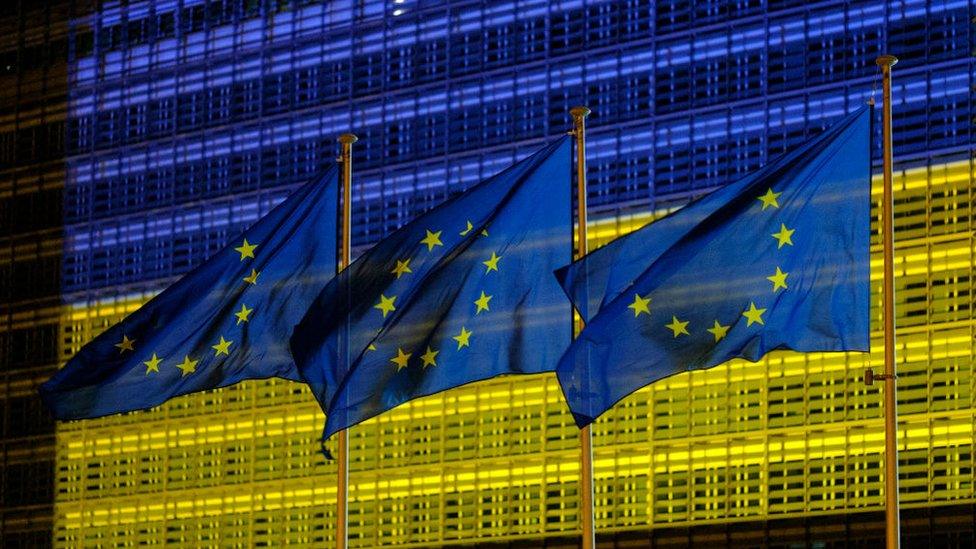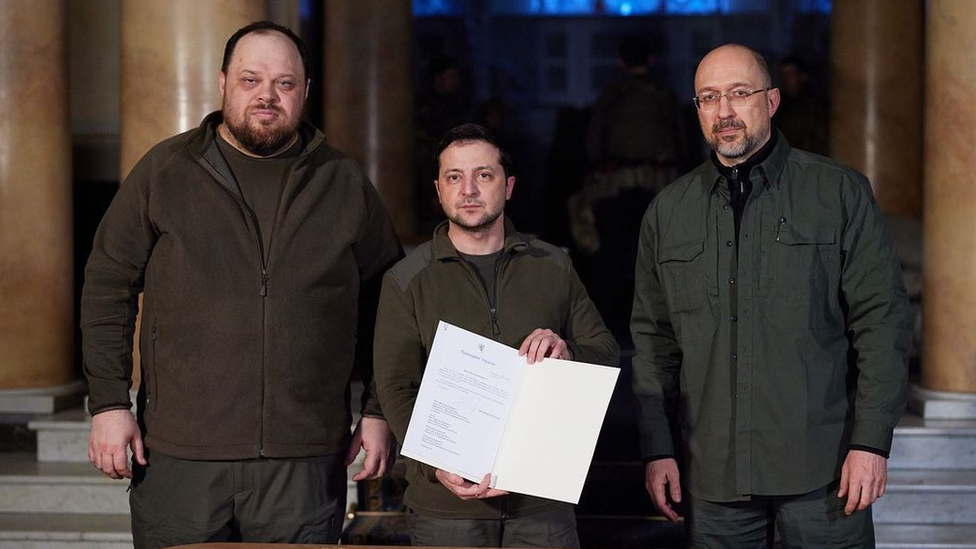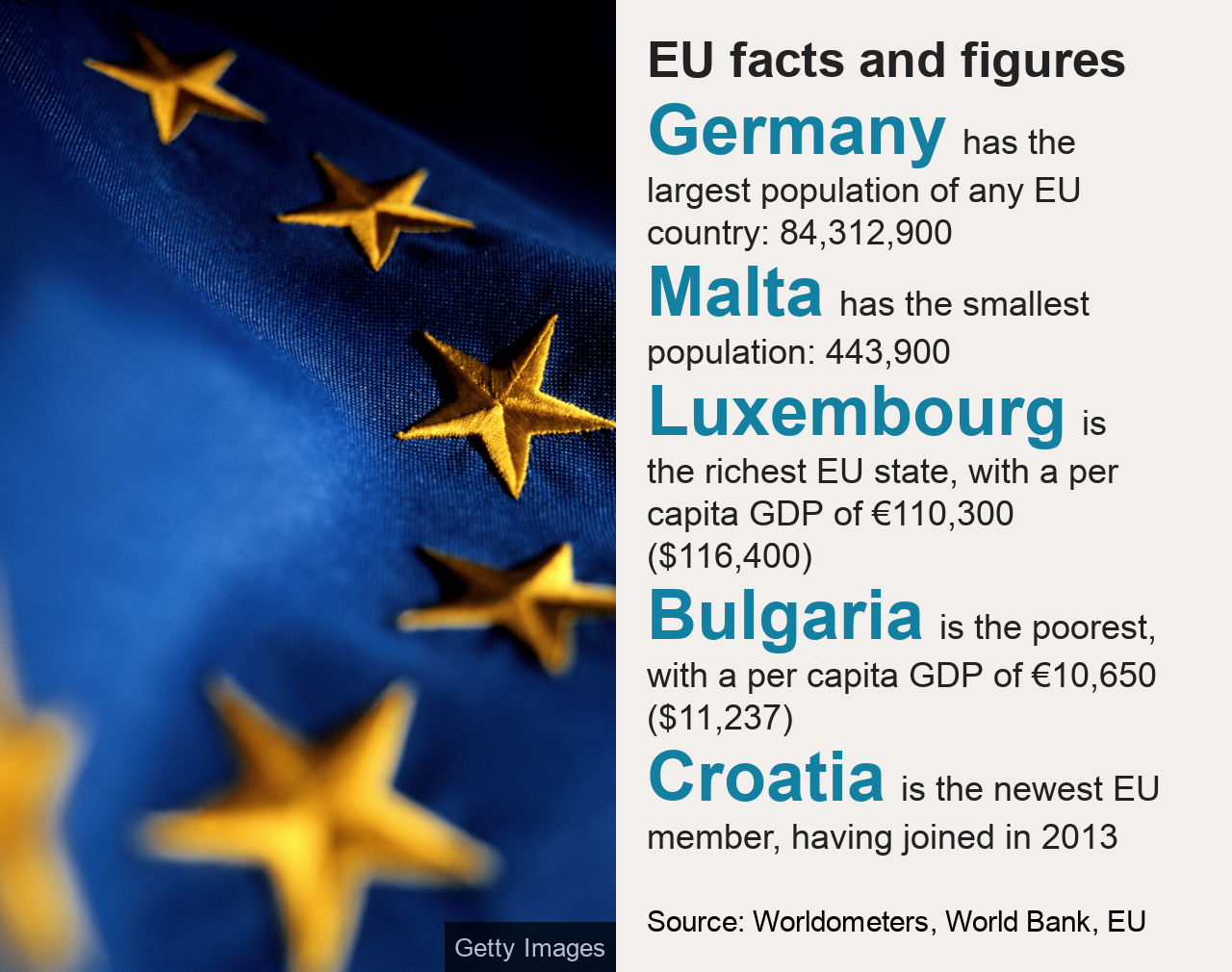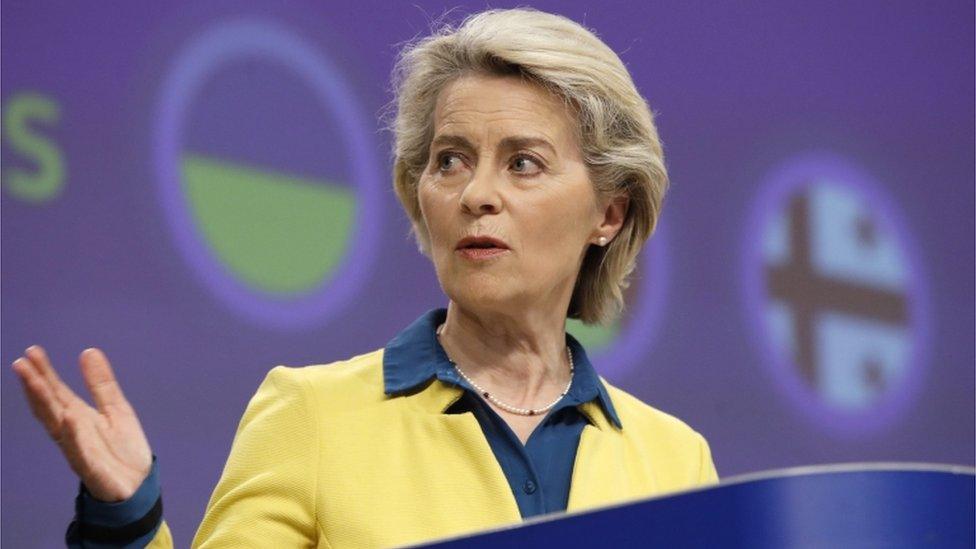How could Ukraine become an EU member and what does Russia say?
- Published

Ukraine has become an official candidate for European Union (EU) membership, the first step to joining the organisation.
The process could take years to complete and there is no guarantee of success. Moldova has also been granted EU candidate status.
What is the EU?
The EU is an economic and political union, external of 27 countries.
Goods, services and money move freely between member countries. EU citizens can live and work anywhere within the union.
It operates a single European currency, the euro, which is used by more than 340 million people in 19 of its nations.
Members apply the same standards in areas including food safety, farming and employment rights.
The EU also gives grants to its poorer regions, external, to help strengthen their economies.
Why does Ukraine want to join?
President Volodymyr Zelensky began the application for EU membership five days after Russia invaded.
He asked to join immediately.

Ukraine filed its application to join the EU in February 2022
There would be financial benefits to joining the EU.
However, Ukraine's main motive is not economic, argues Dr Zach Paikin, from the Centre for European Policy Studies think tank.
"EU membership would establish Ukraine firmly as an independent, sovereign European state," he says. "Not merely part of the Russian world."
How has Russia reacted?
Although President Vladimir Putin is against Ukraine's long-standing desire to join the Nato military alliance, he insists he has "nothing against" it joining the EU.
However, the Kremlin said it will give the application "increased attention" because the EU is considering its own defence force.
"The military, defence and security components are being discussed," it said. "We are, of course, observing it all thoroughly."
Ukraine's President Zelensky has warned that Russia might retaliate over its application.
"Obviously, we should expect greater hostile activity from Russia," he said. "And not only against Ukraine, but also against other European countries."
How do countries join the EU?
Firstly, the European Commission, the EU's civil service, assesses whether a country is suitable, external.
It considers whether it has a stable, democratic government, respects human rights, and has a free market economy.

All existing EU members have to agree before a new country can become a candidate.
If successful, it has to adopt all the EU's laws and regulations. This normally takes several years.
Finally, the country signs a treaty which all the other EU countries have to formally approve.
How long does joining the EU take?
For recent joiners Bulgaria, Romania and Croatia, it took between 10 and 12 years.
Albania, North Macedonia, Montenegro and Serbia have been official candidates for years, but their applications have stalled.
Turkey became a candidate in 1999. However, the process stalled over concerns about its human rights record.

How would Ukraine fit into the EU?
Largest land mass of any country in the EU: 603,550 sq km (233,032 sq miles). Not counting France's overseas departments
Fifth-largest population: 44.13 million
Ukraine's annual GDP per capita is $3,724 (£3,040) - one-ninth of the EU average
It already sells the EU 30% of all the grain it imports

What are Ukraine's current links with the EU?
Since 2017, Ukraine has been able to trade with EU states without paying tariffs - taxes on goods sent between countries - under a so-called association agreement, external.
As part of its preparation to apply for membership, Ukraine has already changed many of its laws and regulations to meet EU standards.
What else would Ukraine need to do?
European Commission president Ursula von der Leyen says "good work has been done", but that Ukraine must make further "important reforms".

Wearing Ukraine's colours, Ms von der Leyen said she wanted the country "to live with us in the European dream"
These include strengthening the rule of law, improving human rights, reducing the power of oligarchs, and tackling corruption.
Another challenge will be cleaning up Ukraine's court system, which has been widely criticised.
How has EU membership helped recent joiners?
Since joining 15 years ago, Romania's national income has tripled, external and Bulgaria's has doubled, external.
The EU has given tens of billions of euros to both countries to support economic development, external - for example, building new roads and ports.
Between 2014 and 2020, Bulgaria received 11.2bn euros, external and Romania 35bn euros, external.
However, Transparency International argues a lot of this money has been lost through corruption, external.
Bulgaria remains bottom of the EU league, external in terms of wages, health and education, but Romania has risen from second poorest to sixth poorest, external.
Some 1.5 million Bulgarians and 4 million Romanians, external have used the EU's "freedom of movement" policy to travel abroad. Critics fear this "brain drain" could damage both countries' future prospects.